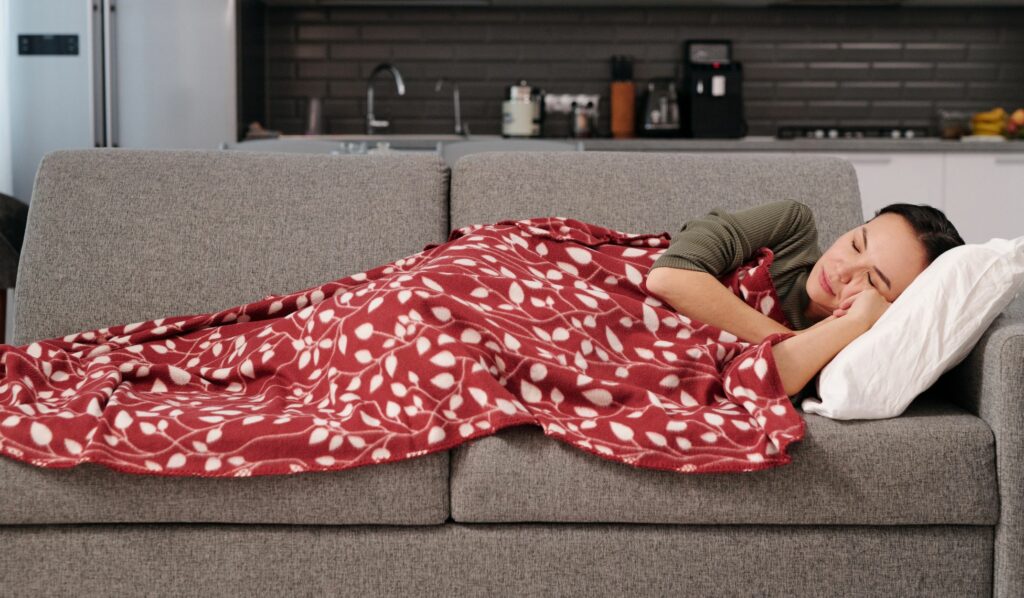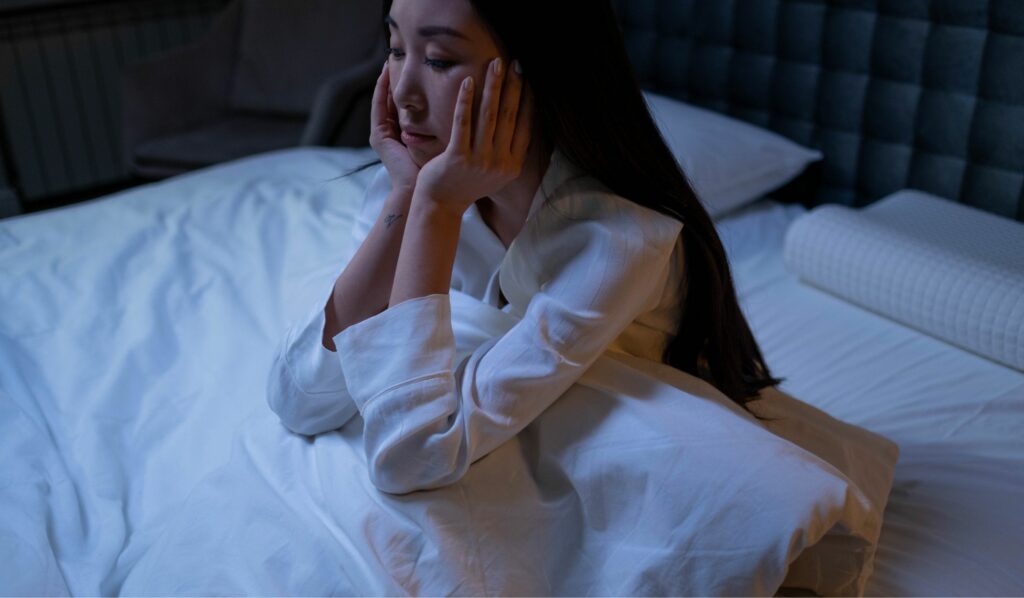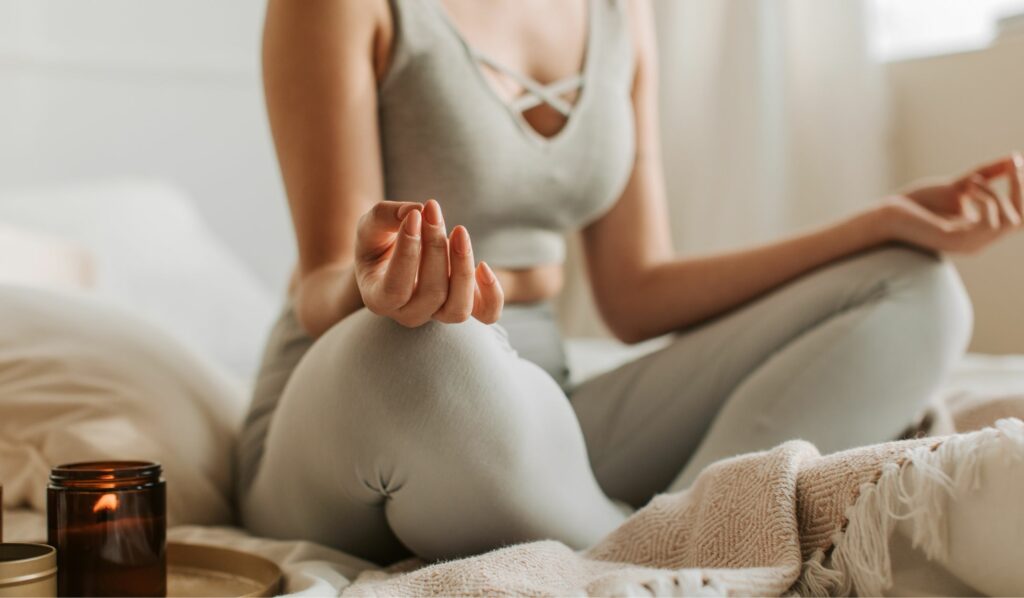


You’ve just had a blissful nap, hoping to recharge your energies and embrace the rest of the day with enthusiasm. However, as you open your eyes, an unwelcome guest crashes your mood – a throbbing headache. Headaches after a nap can be utterly frustrating, leaving you wondering what could have possibly gone wrong.
In this blog, we’ll delve into the intriguing world of post-nap headaches, exploring their potential causes and why your body occasionally protests against a little midday siesta.

The first step you should do is to try to determine the type of headache you are experiencing. And once more, whenever you have any uncertainties, visit a doctor.
Primary headaches are a distinct condition that is not caused by other illnesses. Neck muscle discomfort, overactive nerves, brain chemicals, or dilated blood vessels are just a few of the possible causes of migraine, cluster headaches, or tension headaches. Furthermore, primary headaches may run in families.
Secondary headaches happen when pain-sensitive nerves in the head are activated as a result of an underlying medical condition. They may result from the flu, ear infections, sinus infections, or any other ailment. Identifying and addressing the root cause of these secondary headaches is essential for effective management and relief.

A headache after sleeping is generally nothing to be concerned about. It can be explained away by different reasons, including dehydration, poor sleeping posture, allergies, sleep duration issues, and more serious conditions like sleep apnea or teeth grinding (bruxism). It’s important to note that while many post-nap headaches are benign and can be attributed to these common factors, chronic headaches should prompt a visit to a healthcare professional for a thorough check up.
Below are the 9 most common causes of headaches after a nap.
The most common risk factor for experiencing a headache after a nap is dehydration. To prevent this, it’s essential to stay hydrated by drinking water frequently throughout the day, as dehydration can contribute to various health issues. A headache may occur in situations where you’re constantly on the move without breaks or have skipped meals, such as lunch. Indicators of dehydration include dry mouth and lips, dark-colored urine, lightheadedness, and changes in mood.
Strong headaches can be brought on by unintentionally clenching your jaw as you sleep since it puts more tension on your head’s muscles than is healthy. Additionally, it may interfere with the jaw’s daily normal movement, making even yawning agonizing. Another common dental issue related to this is teeth grinding, or bruxism, which can exacerbate these problems, leading to not only headaches but also dental damage and jaw discomfort.
A delicious cup of coffee in the morning can offer you an instant boost of energy. However, drinking too much coffee and caffeinated drinks can have some unpleasant side effects, such as headache after a nap. Migraines might result from excessive caffeine intake and dehydration. Enjoy your coffee, but remember to stay hydrated by drinking water to keep your body’s fluid balance in check. Coffee’s diuretic properties can result in increased urination and a risk of dehydration without sufficient water consumption.

A muscle strain may be the cause of a headache that gets worse after a snooze. Tension headaches can be caused by pain in the neck, shoulders, or jaw muscles that radiate to the head. The headaches related to muscle tension can be brought on by lengthy periods of non-stop driving, prolonged desk work, or repetitive strain injuries. To alleviate the discomfort of strained muscles, it’s important to incorporate relaxation techniques such as deep breathing exercises or gentle neck and shoulder stretches into your routine especially while working or driving long hours.
Lack of food causes blood sugar levels to fall, which might result in headaches around lunch if you skip breakfast. If you take a nap on an empty stomach, you can wake up with a headache. Additionally, skipping lunch can exacerbate this issue, leading to even more pronounced midday headaches. If you feel hungry, have a little banana and a glass of water before going to bed. If the headache persists despite addressing potential hunger-related triggers and you’re feeling dizzy, it’s essential to explore other possible causes and take appropriate actions.
There are numerous causes of headaches that arise after excessive sleep, but allergies are a big offender. Your frequent sneezing, sore or irritated eyes, fatigue, and a general feeling of illness may be due to allergies. Seeking the expertise of a specialist is essential when it comes to medical problems like allergies. Consult your doctor about whether antihistamines might improve your issues.
If your high blood pressure readings are 180/120 mm Hg and you are also experiencing a headache after a nap, you should consult a doctor immediately. If your blood pressure isn’t very high, it usually won’t give you a headache. Seek immediate medical assistance if you have high blood pressure, feel lightheaded, or have patches on your skin.

The correlation between sleep apnea and headache after a nap can be attributed to the disruption of sleep patterns caused by sleep apnea. Sleep apnea patients and individuals suffering from untreated sleep apnea may be more susceptible to experiencing headaches after daytime naps due to the compromised quality of their sleep. Addressing sleep apnea through proper treatment can significantly enhance sleep quality and alleviate daytime symptoms such as headaches. If you or someone you know is grappling with sleep apnea or related symptoms, it is crucial to seek guidance from a healthcare professional for assessment and suitable management.
The following question is frequently asked: ‘Can pillows cause headaches?‘ In fact, using the bad pillow can be a surprising an underlying cause behind that post-nap headache. Pillows that don’t provide adequate support for your neck and head result in improper alignment of the spine, causing muscle tension and discomfort, and leading to pillow pressure. This misalignment can also restrict blood flow to the brain, potentially triggering headaches. So, choosing the right pillow that suits your sleeping position and provides the necessary support is essential for ensuring a headache-free nap and a more restful sleep overall.
In today’s fast-paced world, we often find ourselves skipping lunch and busy running errands. But sometimes, this frantic pace can lead to an unpleasant surprise: a nagging headache. If you’ve ever experienced that frustrating head pain after a quick nap in the midst of a hectic day, fear not! In this section, we will explore some simple strategies to help you avoid that throbbing head when your schedule doesn’t permit a leisurely midday rest. From light stretches to practicing good sleep hygiene, we’ve got you covered with practical tips to ensure that your nap revitalizes you, rather than leaving you with a head that hurts.
Sleep on your side or your back rather than taking a nap face down on a table because it is the way your body is positioned that causes discomfort when you wake up.
Instead of simply leaning on a desk, try to take your naps in a neutral position somewhere where you can lie down comfortably. Purchase a quality pillow to prevent strain on your neck and upper back, ensuring that you enjoy quality sleep.
If you’re anxious all the time, napping can be challenging. You might even feel tenser than you did before the nap, as opposed to being more relaxed. To prepare your body for sleep and improve your ability to nap effectively, consider incorporating relaxation techniques prior to your nap, such as yoga, meditation, or light exercise before bed. These practices can help alleviate bad moods and create a more conducive environment for restful naps.

Most people use brief naps as stress relief, which is typically accompanied by stress eating. To relax your body and avoid feeling overly bloated when you wake up, avoid eating a lot of food right before bed.
If you intend to drink coffee before your nap, it’s essential to take a short siesta immediately after finishing your coffee. This is because the effects of caffeine typically start to kick in about 30 minutes after consumption. By taking a 10–20 minute nap, you’ll enhance your overall sense of refreshment when you awaken.
Ensure you drink plenty of water, as insufficient hydration is a common issue. Before sleeping, make sure to have a glass of water, as dehydration can lead to waking up with a headache. Many people underestimate the impact of dehydration on their overall well-being, and inadequate water intake can contribute to various health issues, including headaches. It is essential to consistently drink plenty of water throughout the day to maintain proper hydration levels.
Set your alarm, and when it goes off, get up right away to do your responsibilities. Pressing the snooze button would simply result in excessive dozing and additional headaches. Taking power naps helps you feel refreshed and re-energized. Always keep in mind that if you practice napping correctly, headaches after naps can be prevented. Set an alarm immediately, and choose your naps carefully!
If you’re looking to optimize your nap and wake up feeling refreshed, consider using a sleep tracking app like ShutEye®. This app offers a smart alarm feature that can gently wake you up during a light sleep cycle. Taking naps helps you feel refreshed and re-energized, and with ShutEye’s soothing sounds, you can also use it to gently fall asleep and relax during a short nap.
Finally, if you notice certain signs and symptoms of potential sleep disorders, do not ignore them! It is crucial to take proactive steps, including seeking assistance from a healthcare professional, to address any underlying sleep disorders. These sleep disorders not only contribute to post-nap headaches but also significantly impact one’s overall sleep patterns. Therefore, addressing and managing them is paramount to ensuring better sleep quality and reducing the likelihood of experiencing chronic headaches after a nap.
In conclusion, post-nap headaches can be alleviated through simple adjustments: prioritize hydration, opt for shorter and well-timed naps to minimize sleep inertia, seek medical attention if necessary, practice relaxation techniques, and maintain a consistent sleep schedule with good sleep hygiene to ensure you get enough sleep. By adopting these strategies, you can enjoy the revitalizing benefits of naps without the discomfort of a headache, enhancing your overall well-being.
Arca, K. N., & Halker Singh, R. B. (2021). Dehydration and Headache. Current pain and headache reports, 25(8), 56. https://doi.org/10.1007/s11916-021-00966-z
Iliades, C. (2022) 8 Foods That Can Trigger Headaches [online]. Available at: https://www.everydayhealth.com/headache-pictures/8-foods-that-trigger-headaches.aspx
Stanford Healthcare (2024) Types of headache [online]. Available at: https://stanfordhealthcare.org/medical-conditions/brain-and-nerves/headache.html